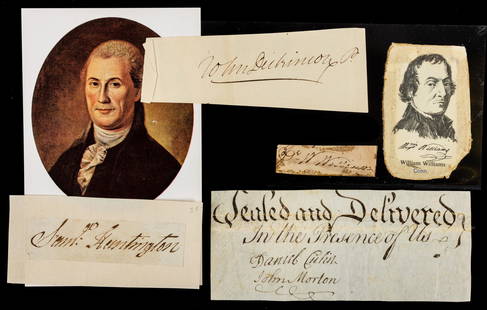
Declaration Signer William Whipple Signed- JSA
Robert Morris Sale History
View Price Results for Robert MorrisRelated Political Memorabilia
More Items from Robert Morris
View MoreRecommended Historical Memorabilia
View More





Item Details
Description
DescriptionWhipple William Signed great content. Comes with full LOA from JSA.Declaration Signer William Whipple Informs Robert Morris that the Amphitrite Is Ready to Sail for France WILLIAM WHIPPLE, Autograph Document, to Robert Morris, ca. July 1777, [Portsmouth, New Hampshire]. 1 p., 7.75 Tears on folds affecting three words; some staining. Complete TranscriptThe Amphitrite will sail this week agreeable to orders The Captain did not make the least difficulty after receiving the Letter I Brought from the Committee but immediately set about preparing his ship for her voyage.Thus Sir have I given you an accot: of Navy matters in this Quarter [Docketing:] to Robt Morris Esqr / 6 July Part of the Langdon Papers offered by University Archives in the 1990s. Historical BackgroundThe Amphitrite sailed from France at the end of 1776 with 15,000 uniforms, 10,000 muskets, and approximately 75 bronze cannon, all funded by the flamboyant French playwright, revolutionary, and arms dealer Pierre Beaumarchais (1732-1799). When the Amphitrite arrived in Portsmouth, New Hampshire, in April 1777, those supplies and weapons were unloaded and played a key role in the American victory at Saratoga in the fall of 1777. The Secret Committee of the Continental Congress ordered Captain John Paul Jones to proceed to Portsmouth and join Captain Nicholas Fautrel aboard the Amphitrite with enough men to man any prizes they could capture during their voyage. The Secret Committee would supply provisions for the American crew, while Fautrel would supply the French crew. They would divide any prizes they could capture. The purpose of the plan was to get Jones to France, where he and his crew could transfer to a frigate that the American Commissioners in France had acquired. However, when Jones arrived in Portsmouth at the beginning of June, he discovered that Fautrel “absolutely refused” to allow Jones aboard in any other capacity than as a passenger, feeling it would be “a dishonor to the French flag” to allow JonesÂ’s commission to supersede his own. A frustrated Jones returned to Boston. On June 13, the Secret Committee met, with Robert Morris, William Whipple, and Philip Livingston in attendance, and considered FautrelÂ’s rejection of their plan. The Committee decided to forward his letter to Congress, recommending that he receive the assurances he required to proceed to Charleston for a load of rice. Also in mid-June, New Hampshire issued a privateer commission to Captain Fautrel of the Amphitrite to allow him to take prizes along his voyage to South Carolina and return to France. On June 18, Congress sent William Whipple from Philadelphia to Boston with instructions for Jones to take command of the Ranger, a new sloop recently constructed in Portsmouth. The Amphitrite sailed from Portsmouth to Charleston, South Carolina, in July-August 1777, loaded a cargo of rice and indigo, then returned to France from Charleston in October and November 1777. William Whipple (1730-1785) was born in Maine and became a shipÂ’s master at the age of 21. He earned a fortune in trade with the West Indies, shipping cargoes of wood, rum, and slaves. In 1759, he established himself as a merchant in Portsmouth, New Hampshire. He served in the New Hampshire Provincial Congress and represented New Hampshire in the Continental Congress, where he signed the Declaration of Independence. He also commanded a brigade at the Battle of Saratoga and negotiated the surrender of the British forces there. After the war, he served as an Associate Justice of the Superior Court of New Hampshire. Robert Morris (1734-1806) was born in Liverpool and immigrated to Maryland at the age of 13. His father later sent him to Philadelphia to study, and in 1757, he became a partner in a banking and shipping firm, which lasted until 1779. A delegate to the Second Continental Congress, he opposed the motion for independence but abstained in the final vote. He signed the Declaration of Independence after it passed. He personally paid £10 million to fund the American army during the Revolutionary War and was critical to the new governmentÂ’s success. He also chaired the Marine Committee of the Continental Congress. He signed the Articles of Confederation in 1778, and in 1781, Congress appointed him as Superintendent of Finance of the United States, a position he held until 1784. Elected to the Constitutional Convention in 1787, Morris nominated his friend George Washington as its president, and he signed the new constitution. Washington wanted to appoint Morris as Secretary of the Treasury, but Morris declined and suggested Alexander Hamilton. Morris served as U.S. Senator from Pennsylvania from 1789 to 1795. Deeply engaged in land speculation, he bought millions of acres of land in western New York from Massachusetts in 1791. His speculations ended him in debtorsÂ’ prison for more than three years (1798-1801). After Congress passed bankruptcy legislation, he reached a settlement with his creditors but remained destitute.
Buyer's Premium
- 25%
Declaration Signer William Whipple Signed- JSA
Estimate $1,000 - $1,200
2 bidders are watching this item.
Get approved to bid.
Shipping & Pickup Options
Item located in Mount Laurel, New Jersey, usOffers In-House Shipping
Local Pickup Available
Payment

TOP





















![Declaration Signer William Williams Scarce War Dated DS: Williams William Declaration Signer William Williams Scarce War Dated DS A partly printed land grant signed on the verso "W. Williams" done on the "forth [sic] day of February, 1777". The document gra](https://p1.liveauctioneers.com/6306/158354/79957261_1_x.jpg?height=310&quality=70&version=1577465723)











![[Signer of Declaration, William Ellery] Ledger, 1790: William Ellery's ledger, oblong folio in stitched buff paper wrappers. Leaves captioned (at top) "Abstract of Bounty on dried and pickled fish, and salted provision exported from the District of Newpo](https://p1.liveauctioneers.com/3532/146911/74242101_1_x.jpg?height=310&quality=70&version=1564368564)



































